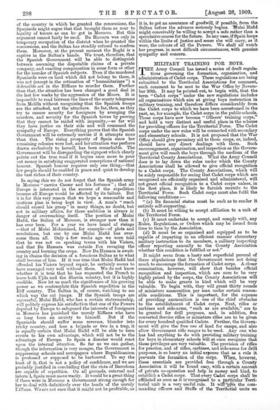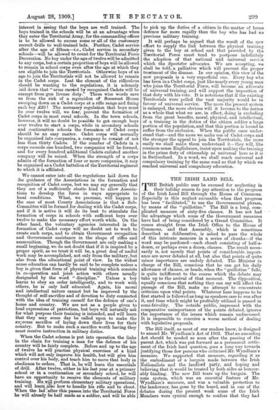ATTLTTARY TRAINING FOR BOYS. Army Council has issued a series
of draft regula. 1. tions governing the formation, organisation, and administration of Cadet corps. These regulations are being submitted to the Territorial Associations for comment, such comment to be sent to the War Office by Novem- ber 30th. It may be pointed out, to begin with, that the term "Cadet corps" under the new regulations includes all organisations which aim at giving boys instruction in military training, and therefore differs considerably from the Cadet corps to which we have been accustomed in the past, as, for example, the Cadet corps in the public schools. These corps have now become "Officers' training corps," and hold a very distinct and useful place in the scheme for providing officers for the Territorial Force. The Cadet corps under the new rules will be connected with secondary and elementary schools. It is not proposed that the War Office should give pecuniary aid to these corps, or, indeed, should have any direct dealings with them. Such encouragement, organisation, and inspection as the Govern- ment give will reach the boys through the medium of the Territorial County Associations. What the Army Council does is to lay down the rules under which the County Associations shall be allowed to give official recognition to a Cadet corps. The County Associations, which will be solely responsible for seeing that Cadet corps which are recognised are efficiently organised and administered, will not grant official recognition to a Cadet corps unless, in the first place, it is likely to furnish recruits to the Territorial Force. Such Cadet corps must also fulfil the following conditions :— "(a) Its financial status must be such as to render it entirely self-supporting. (b) It must be willing to accept affiliation to a unit of the Territorial Force.
(c) It must undertake to accept, and comply with, any Rules, Regulations, or Orders which may be issued from time to time by the Association. (d) It must be so organised and equipped as to be capable of imparting in an efficient manner elementary military instruction to its members, a military inspecting officer reporting annually to the Count, _Association whether this condition is fulfilled or not."
It might seem from a hasty and superficial perusal of these stipulations that the Government were not doing much to encourage the formation of Cadet corps. A closer examiaation, however, will show that besides official recognition and inspection, which are sure to be very highly prized by the corps, the County Associations will be able to make grants in kind which will be very valuable. To begin with, they will grant thirty rounds of miniature ammunition per man under certain reason- able conditions. This is important, for the expense of providing ammunition is one of the chief obstacles to the establishment of Cadet corps. Next, rifles or carbines and side-arms, "such as are available," are to be granted for drill purposes, and, in addition, five converted Service rifles or miniature rifles are to be given. for every hundred qualified Cadets. Further, the Govern- ment will give the free use of land for camps, and also allow Government rifle ranges to be used.. Any one who has had anything to do with providing military training for boys in elementary schools will at once recognise that these privileges are very valuable. The provision of rifles for practice, and of 'rifles, carbines, and side-arms for drill purposes, is so heavy an initial expense that as a rule it prevents the formation of the corps. When, however, these essentials are provided free through a County Association it will be found easy, with a certain amount of private co-operation and help in money and 1ina, to establish a Cadet corps. That -every Cadet corps shall be affiliated as soon as it is:recognised to a prticular Terri- torial unit is a very useful rule. It wiflb the com- manding officers and Staffs of the Terrflolial units an interest in iieeing that the boys are well trained. The boys trained in the schools will be at an advantage when they enter the Territorial Army, for the commanding officer is to be allowed, to excuse some or all of the customary. recruit drills to well-trained lads. Further, Cadet service after the age of fifteen—i.e., Cadet service in. secondary schools—will be allowed to count for the Territorial Force Decoration. No boy under the age of twelve will be admitted teeny corps, but a certain proportion of boys will be allowed to remain in school corps even after the age at which they are eligible to join the Territorials. Otherwise boys of an age to Join the Territorials will not be allowed to remain in the Cadet corps. Lest the element of the ridiculous should. be wanting to the regulations, it is solemnly laid. down that "arms carried by recognised Cadets will be exempt from gun license duty.' These wise words save us from the risk of a myrmidon of Somerset House swooping down on a Cadet corps at a rifle range and fining each boy X20 ! The necessary regulation that boys must be over twelve will, we fear, prevent the formation of Cadet corps in most rural schools. In the town schools, however, it will no doubt be possible to get enough boys over twelve to start a corps, while in secondary schools and continuation schools the formation of Cadet corps should be an easy matter. Cadet corps will normally be organised into companies, a company to consist of not less than thirty Cadets. If the number of Cadets in a corps exceeds one hundred, two companies will be formed, and for every hundred additional Cadets enlisted another company will be raised. When the strength of a corps admits of the formation of four or more companies, it may be organised as a Cadet battalion of the Territorial regiment to which it is affiliated..
We cannot enter into all the regulations laid down for the guidance of the Associations in the formation and recognition of Cadet corps, but we may say generally that they are of a sufficiently elastic kind, to allow Associa- tions to develop the force in ways appropriate to local conditions. What, we presume, will happen in the case of most County Associations is that a Sub- Committee will be formed for dealing with the Cadet corps, and if it is active it will do its best to stimulate the formation of corps in schools with sufficient boys over twelve to make the necessary effort worth while. On the other hand., the -voluntary agencies interested. in the formation of Cadet corps will no doubt set to work to create such corps, and to obtain Government recognition and Government assistance in the shape of rifles and ammunition. Though the Government are only making a small beginning, we do not doubt that if it is inspired by a proper spirit, as we trust it will be, a great deal of useful work may be accomplished, not only from the military, but also from the educational point of view. In the widest sense education can hardly be said to be complete unless a boy is given that form of physical training which consists in co-operation and joint action with others usually designated by the word "discipline." *Unless a boy learns to obey an order intelligently, and to work with others, he is only half educated. Again, his moral and intellectual nature cannot but be improved. by the thought of self-sacrifice and of devotion to duty connected with the idea of training oneself for the defence of one's home and. country. We are not as a people given to loud expressions of patriotism, but boys will naturally ask for what purpose their training is intended, and. will learn that they may some day: be called upon to make the supreme sacrifice of laying down their lives for their country. But to make such a sacrifice worth having they must receive instruction in military duties.
When the Cadet scheme is put into operation the links in the chain for training a man for the defence of his country will be fairly complete. Before and. up to the age of twelve he will practise physical exercises of a Lind which will not only improve his health, but will give him control over his body, and teach him to move that body in obedience to orders. That is, he will learn the essentials of drill. After twelve, either in his last year at a primary school or in a, continuation or secondary school, he will have an opportunity to receive, the elements of military training. He 7-Ajj perform elementary military operations, and. will learn ,alio how to handle his rifle and to shoot. When the lad. after this passes into the Territorial Force he will already be half made as a soldier, and will be able to pick up the duties of a citizen in the matter of home defence far more rapidly than the boy who has had no previous military training.
It will perhaps be argued that the result of the new • effort to supply the link between the physical training given to the boy at school and that provided by the Territorial Force must tend. to postpone indefinitely the adoption of that national and universal service which the Spectator advocates. We are accepting, we shall be told, a palliative which will prevent the proper treatment of the disease. In our opinion, this view of the new proposals is a very superficial one. Every boy who • has been in a Cadet corps, just like nearly every young man who joins the Territorial Force, will become an advocate of universal training, and will support the imposition of that duty with his vote. It is notorious that if the existing Territorials were 'polled the vast majority would be in favour of universal service. The more the present system is enlarged, the more obvious will it become to the nation as a whole that what we are, in effect, doing is excluding from the great benefits, moral, physical, and. intellectual, of a training in the duties of the citizen soldier a large portion of the population; and that this portion is bound to suffer from the exclusion. When the public once under- stand that—and the more we make use of Cadet corps and the stronger the appeal to join the Territorials, the more easily we shall make them understand it—they will, like common-sense Englishmen, insist upon making the training in the prime duty of citizenship as universal here as it is in Switzerland. In a word, we shall reach universal and compulsory training by the same road as that by which we reached universal and compulsory education.







































 Previous page
Previous page